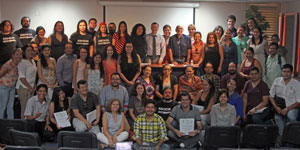TBI Teaches Peacebuilding in Sinaloa, Mexico

This spring, the Trans-Border Institute delivered a series of three seminars in peacebuilding, human rights, and citizenship in collaboration with the National Autonomous University of Sinaloa, in Culiacán, Sinaloa.
The seminars explored how to use human rights to realize our potential as human beings, different models of peacebuilding to realize our potential as citizens, and an historical perspective to realize our potential as a society active in the present and committed to a better future.
The idea behind the seminars was to create a forum for the leaders of local non-governmental organizations, university faculty, and student leaders, where they could re-think the causes and consequences of violence and corruption in their region, and work collaboratively to develop solutions.
The moment was ripe. In the wake of the terror and indignation provoked by the forced disappearance of 43 students in Guerrero last fall, Mexican civil society has organized and demanded justice like never before. Part of this awakening has involved a new recognition of community organizations who have worked for peace and justice for years, but in relative obscurity, vulnerable to all kinds of abuse. These organizations are on the front lines of an epic struggle and they know its realities better than anyone. But they have neither the resources nor the capacity to convert their experience into new public policies. This gap presents a unique opportunity for academic institutions – the opportunity to mobilize their knowledge and technical capacity to make positive social change, right now.
Offering the seminars in Sinaloa posed a unique opportunity and generated a lot of local buzz. On one hand, Sinaloa has suffered a disproportionate amount of corruption and violence going back decades. It is the cradle of modern drug trafficking in Mexico, the birthplace and sentimental homeland of most of Mexico’s most infamous drug traffickers, and the headquarters of it most powerful cartel. As a result, Sinaloa has been saddled with a dangerous reputation (often exaggerated), and it has been more isolated from national and international networks of peace and human rights organizations than many other places in Mexico.
On the other hand, Sinaloa has a very strong and very democratic university tradition, innovative local civic organizations, critical journalism, and an important tradition of global engagement and exchange going back centuries. Most important, it has a generation of students and young people hungry for something different.
Working with a group of graduate students from the Kroc School of Peace Studies, TBI staff designed a curriculum featuring a variety of comparative case studies and interactive exercises. Using slides, excerpts from primary documents, and video testimonials, the participants explored the evolutionary origins of empathy, the movement against forced disappearances in Argentina, atrocities and PTSD in Vietnam and Iraq, decisions by the Inter-American Court of Human Rights on femicide and the abuse of street children, anti-extortion campaign in Sicily, and non-violent protest in the U.S. civil rights movement, among many other examples. In group exercises, the participants developed human rights and humanitarian responses to various global crises, anti-corruption campaigns, and peacebuilding curricula for various constituencies in Culiacán.
Demand for the seminar was high and the organizers turned away as many students as they were able to enroll. In total, TBI and the UAS issued 67 certificates to students ranging in age from 19 to 67. The closing ceremony was terrific, and officials from the UAS, including the former dean of the Law Faculty marveled at the organizers’ ability to attract so many students and to produce so much energy for a non-credit seminar on the weekend (particularly for the Sunday morning sessions).
The participants praised the seminars for being broad, multi-disciplinary, and interactive – particularly the group exercises. They appreciated the chance to engage with local colleagues in new ways and to examine their own society through the prism of a variety of comparative case studies. Many respondents asked for longer seminars, a full certificate program, and the opportunity to pursue a master’s degree in peacebuilding.
TBI is currently working on a similar seminar series for Tijuana this fall and an expanded version for next year in Culiacán.
Contact:
Ev Meade
emeade@sandiego.edu
(619) 218-5946



